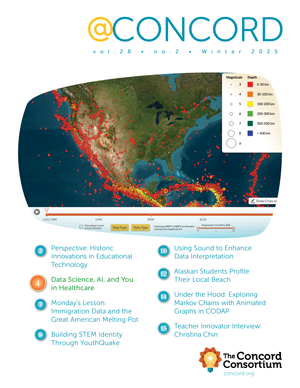Innovator Interview: Colin Dixon
“Magic happens when technology becomes secondary and in service of something like telling a story.”
 When Colin was young, he thought science was a set of procedures to follow. Now, one of his main goals is helping students see that science is about discovery and exploration, done in and with community.
When Colin was young, he thought science was a set of procedures to follow. Now, one of his main goals is helping students see that science is about discovery and exploration, done in and with community.
As an undergraduate at Northwestern University, Colin majored in communications and poetry. But through his work with Chicago SCORES, teaching soccer and creative writing to elementary and middle school children in the afterschool program, he discovered the importance of linking the development of the mind and body. He also saw the value for young people of being active in their communities—of “finding your voice and sharing your experience.”
After teaching English and working on youth development projects in Uzbekistan for the Peace Corps, he made his way to the Washington, D.C., area, where he was the founding director of a nonprofit bicycle shop. With local grants, fundraising, and revenue from sales and service, the store employs and trains youth, many of whom are recent immigrants. “Some of these kids didn’t feel like they had a place in the larger community,” observes Colin. Learning how a bike works and being able to repair it provided them with technical expertise “that helped them to know there was a chance to be present in the community in a way that was not possible in other places,” says Colin. “Being not just present, but valued for your knowledge and ability is central to the value of ‘making’ and citizen science.”
Intrigued by these ideas, Colin set out to the University of California Davis to study the intersection of technical learning with participation in public life. He surveyed local citizen science projects with Heidi Ballard, founder of the UC Davis Center for Community and Citizen Science, and connected with researchers and educators at the East Bay Academy for Young Scientists. The work “focused on communities not well served by the science infrastructure and kids not necessarily already tied into science,” explains Colin, who did a case study of one youth citizen science group that monitors water quality to help restore a local creek.
With another UC Davis faculty advisor, Lee Martin, he converted a van into a mobile maker space, outfitted with both traditional crafting and high-tech tools. They set out to foster and research the development of adaptive expertise, especially within STEM disciplines. Colin was surprised by the variety of projects that young people pursued when given the chance to direct their learning, like one young man’s embroidered patches based on Mexican Air Force participation in WWII. In one of Colin’s favorite projects, students collected air quality data in the Oakland transit system, then used a laser cutter and Arduinos to create objects that shared the data with community members in real time.
Colin recently completed his Ph.D. in Learning and Mind Sciences. As a research associate at the Concord Consortium, he works on the InSPECT project, which uses inexpensive DIY lab instruments in open-ended, technology-enhanced high school biology experiments designed to facilitate inquiry. Colin sees the excitement as students use and interact with sensors and see data appear on a screen. These students may never have used a Clapper to turn on a light, observes Colin, but “seeing that they can produce and control flows of data in the same way is very powerful.”
On the Paper Mechatronics project, which is developing new ways to advance engineering education through computationally enhanced children’s papercrafts, Colin says, “Magic happens when technology becomes secondary and in service of something like telling a story.” He hopes that all students will come to view science as a disciplined yet creative pursuit, a reflection of the world they live in and the world they want to live in.
